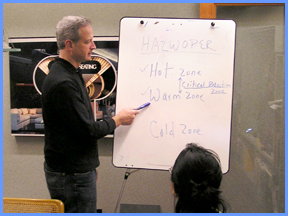 PHASE Associates offer a wide variety of training classes onsite at the client facility. We will design training programs to meet our clients' special needs.
PHASE Associates offer a wide variety of training classes onsite at the client facility. We will design training programs to meet our clients' special needs.
Asbestos Awareness
The program is designed for affected employees of health effects associated with asbestos exposure, the manner by which exposure may occur and procedures that can be followed to protect themselves.
Biosafety
Attendees are instructed on the identification of biological materials being used, risk evaluation for the potential in personnel exposure or environmental contamination, blood borne pathogen exposure and post-exposure, Hepatitis vaccination program, design of written policies and programs, and review to determine the effectiveness of these programs. This training program will cover the provisions under the Federal OSHA Blood borne Pathogens regulations.
Attendees are taught both the physical and chemical hazards associated with the storage, handling and usage of compressed gas cylinders and the proper procedures needed to eliminate the potential risks.
Offer attendees who work in or around confined spaces the understanding, knowledge and skills necessary for the safe performance of their assigned duties.
All classes are custom designed to your needs, content and hours can be varied. All classes are OSHA, MSHA and/or NFPA compliant. Hours range from one to 4 days. Some topics may include confined space entry, attendee, and supervisory awareness, fall arrest systems, lock-out/tag-out procedures, rope rescue skills, anchors, belays, hauls, lowers, patient packaging, patient packaging, team communication skills and rescue team concepts.
Attendees are made aware of the science of ergonomics, the known risk factors for developing repetitive stress injuries and actions that can be taken to minimize the chances of sustaining an injury.
Attendees are taught all aspects of fall protection including guarding and restraint and personal arrest systems.
This course is designed to develop in-house expertise for identifying potential safety hazards and developing effective corrective and/or preventative actions.
Attendees are taught the physical and chemical hazards inherent in the use of chemicals, the ways that this information can be obtained and how to use this information to safely handle chemicals in their workplace.
Supervisory, 8-hour, 24-hour and 40-hour courses are available for attendees required to work at hazardous waste sites or as emergency responders to a chemical release.